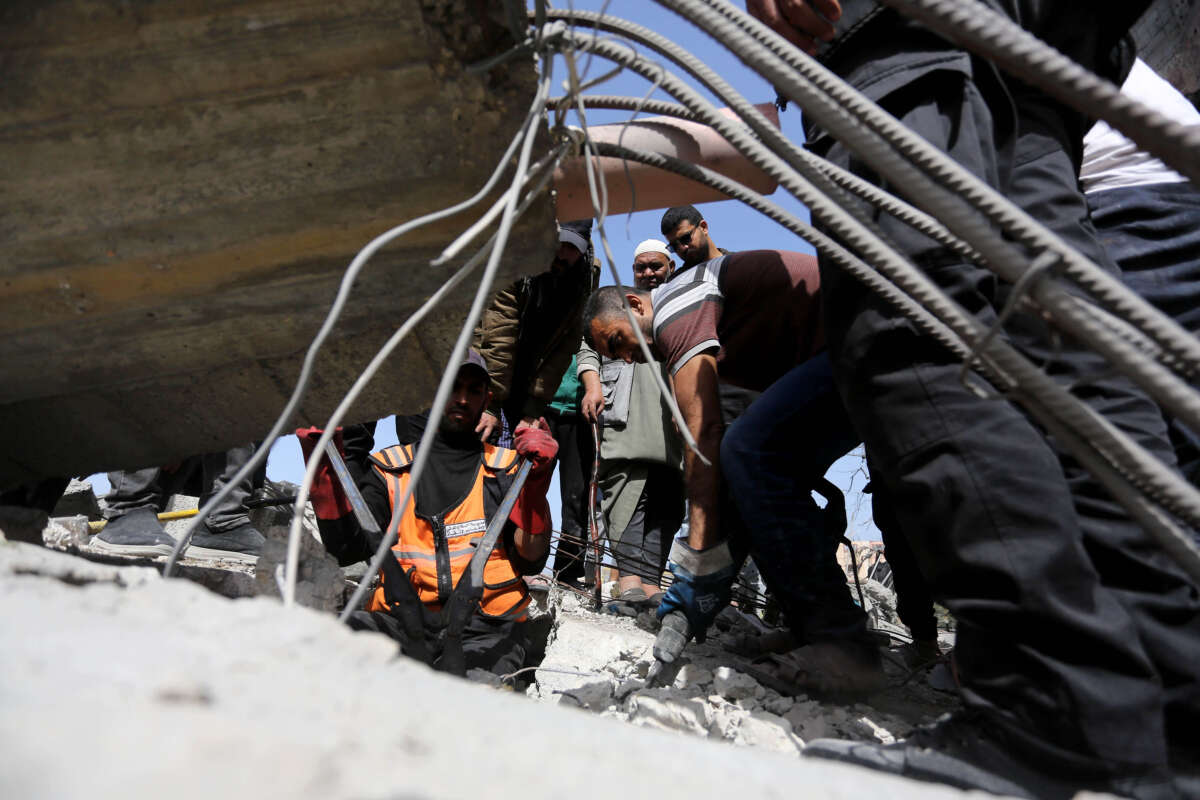Honest, paywall-free news is rare. Please support our boldly independent journalism with a donation of any size.
In addition to the over 34,000 Palestinians who have been counted as killed in Israel’s genocidal assault so far, there are 13,000 Palestinians in Gaza who are missing, a humanitarian aid group has estimated, either buried in rubble or mass graves or disappeared into Israeli prisons.
In a report released Thursday, Euro-Med Human Rights Monitor said that the estimate is based on initial reports and that the actual number of people missing is likely even higher.
The group says missing people are either trapped under the rubble of buildings destroyed by Israeli airstrikes or bulldozers; buried in mass graves with no identification; or arrested by Israeli forces and put into prisons with torturous conditions without charges, with the Israeli army refusing to identify the people they’ve detained and often killing Palestinians in custody or allowing them to die. The group has previously found that there are over 120 mass graves in Gaza, due to the sheer speed with which Israel is killing Palestinians.
Those missing also include people whose bodies have been exhumed from mass graves in and around hospitals by Israeli forces, who are still holding dozens of bodies in custody.
Rights groups and government officials have also said that the death toll is an undercount, with government workers in Gaza having trouble gathering and identifying the dead due to Israel’s dismantling of any form of social or physical infrastructure in Gaza, including all of the region’s hospitals.
The Gaza health ministry has been relying on death counts from hospitals in the region. But these hospitals long ago lost their ability to communicate properly due to Israel’s blockade of electricity and systemic dismantling of Gaza’s health care system. Death counts also come from public sources like the media, according to a review of health ministry documents by NPR in February.
With the destruction of the health system, many Palestinians have not been able to take their family members to hospitals in order to receive medical assistance, even when they’re in dire need of it. On top of the fact that seemingly no one and nowhere in Gaza is safe from Israeli forces’ violence, it has been extremely difficult for the government to come up with official death counts.
As a result, the estimate of at least 13,000 Palestinians missing suggests that the death toll could be an undercount by a margin of thousands of people.
For instance, as Euro-Med notes, humanitarian aid and civil workers recently recovered 422 bodies from Al-Shifa Hospital and the surrounding area after the Israeli military raided and completely destroyed the hospital over two weeks.
“The international community must act swiftly and forcefully to defend Palestinian civilians against the genocide that Israel has been committing in the Strip for the past six months. The international community must also work together to ensure that Israel complies with international law and the ruling of the International Court of Justice, and is held responsible for all its crimes, including the massacre conducted in Al-Shifa Medical Complex,” Euro-Med said in its report, which also calls for a mobilization of workers to try to save any people who may still be alive under the rubble.
A terrifying moment. We appeal for your support.
In the last weeks, we have witnessed an authoritarian assault on communities in Minnesota and across the nation.
The need for truthful, grassroots reporting is urgent at this cataclysmic historical moment. Yet, Trump-aligned billionaires and other allies have taken over many legacy media outlets — the culmination of a decades-long campaign to place control of the narrative into the hands of the political right.
We refuse to let Trump’s blatant propaganda machine go unchecked. Untethered to corporate ownership or advertisers, Truthout remains fearless in our reporting and our determination to use journalism as a tool for justice.
But we need your help just to fund our basic expenses. Over 80 percent of Truthout’s funding comes from small individual donations from our community of readers, and over a third of our total budget is supported by recurring monthly donors.
Truthout has launched a fundraiser to add 500 new monthly donors in the next 10 days. Whether you can make a small monthly donation or a larger one-time gift, Truthout only works with your support.
